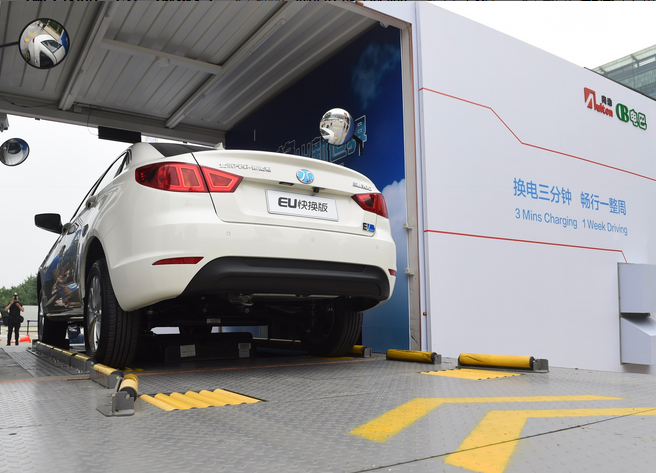BEIJING, June 11 (Xinhua) -- China is stepping up efforts to promote battery swap service, which allows drivers to quickly change their electric vehicle's power battery rather than having to plug it in to recharge.
With policy support and efforts made by leading electric car makers, battery swap is embracing a promising prospect in China. The market size of battery swap for taxis alone can top nearly 90 billion yuan, an analyst said.
Looking into the future, China will focus on exploring the value of power battery in whole life cycle and build an ecosystem for the integration of power battery with vehicle manufacturing, energy management, smart travel and smart city construction.
-- Policy support
China has introduced measures in favor of electric vehicles (EVs) with swappable batteries to help solve the problem of long charging times that dissuades consumers from buying EVs.
The country's latest subsidy plan for new energy vehicles (NEVs) released in April specified that NEVs priced over 300,000 yuan are not eligible for subsidies, but those with swappable batteries are exempt of the rule.
The move aimed to encourage innovative business models, according to a statement of the Ministry of Finance.
At local levels, Beijing and Guangzhou are actively promoting application of battery swap and electric taxis.
Beijing, for example, made it clear in last July that electric taxis should be capable of employing swapping mode, particularly fast battery swap.
To further propel NEV development, the capital city plans to construct 100 battery swap stations this year.
Currently, swapping facilities are mainly built in coastal areas with high penetration rate of NEVs when inland provinces such as Sichuan and Hunan have seen rising battery swap business, showed data from China Electric Vehicle Charging Infrastructure Promotion Alliance.
As the next step, the Ministry of Industry and Information Technology (MIIT) will optimize development environment, guide enterprises to improve battery swap technology, promote the formation of a more mature business model, and further improve the convenience of NEV usage, stated an official with MIIT.
-- Service by leading EV makers
Chinese electric car makers including BAIC BJEV and Nio have been testing battery swap service and offered consumers the option of buying batteries and vehicles separately.
As of May, BAIC BJEV, a subsidiary of the state-owned BAIC Group, has set up over 200 battery swap stations for about 18,000 electric-powered taxis in 19 Chinese cities including Beijing, Xiamen, Lanzhou and Guangzhou.
The EV manufacturer said it would have another 30,000 electric taxis with swappable batteries run on the streets across the country in 2020, and increase the number of swap stations from 187 in 2019 to 300 by the end of this year.
Nio allows consumers to choose to upgrade battery packs or rent EV batteries. The company has built 125 battery swap stations in 53 cities in China, with over 400,000 batteries having been swapped so far. It plans to build more stations this year.
Such EV makers have joined hands with battery giants, quickening the development of battery swap industrial chain.
For example, BAIC BJEV and Daimler AG's wholly-owned subsidiary Mercedes-Benz Energy entered into a development partnership last year, interning to establish second-life energy storage system in China by making use of retired BAIC BJEV's EV batteries.
-- Growth potential
As relevant technology and business environment continue to improve, coupled with policy support, batter swap service is gradually exhibiting advantages.
The swap system can not only save charging time for drivers, but also lower the spending on buying EVs since consumers are offered the option to purchase car and batteries separately.
Besides, retired EV batteries have the potential for evening out fluctuation in grid systems and supporting power failure management.
Battery swap service is expected to benefit vehicle manufacturers, users and operating enterprise. A 30-percent gross profit can be realized when the price of swapping batteries is maintained at above 0.24 yuan per kilometer and over 100 EVs draw into swap stations per day, according to Shenwan Hongyuan Securities.
The idea was echoed by Chen Quanshi, director with automobile research Institute of Tsinghua University, who said that battery swap for electric buses, taxis, logistic vehicles can sustain in China when talking about the cost-effectiveness of battery swap.
The market size of battery swap for taxis alone can top nearly 90 billion yuan, calculated by the average daily swapping price of 20,000 to 30,000 yuan on daily mileage of 300 kilometers, reckoned Wang Guanqiao, chief analyst in intelligent electric vehicle with Western securities.
Currently, China is working to establish uniform industry standards to enable EV drivers to quickly replace their empty batteries at any charging facilities, no matter which brand of EVs they have.
Looking into the future, China will focus on exploring the value of power battery in a whole life cycle and build an ecosystem for the integration of power battery with vehicle manufacturing, energy management, smart travel and smart city construction. (Edited by Su Dan with Xinhua Silk Road, silviasu07@163.com)




 A single purchase
A single purchase









